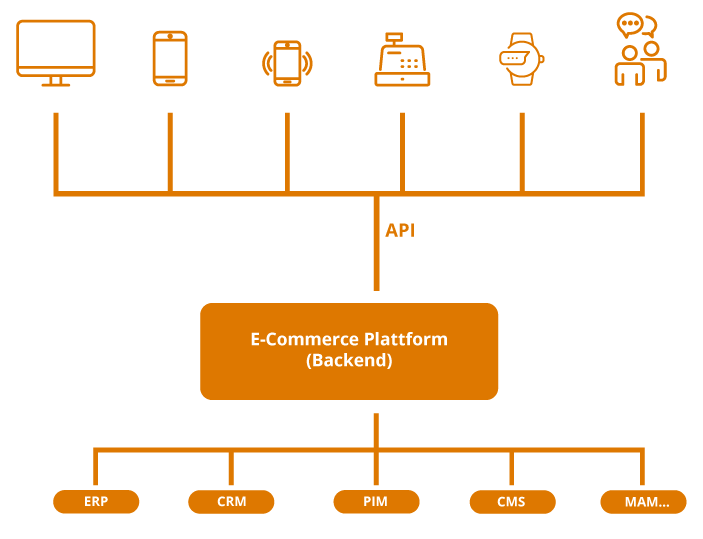The agony of choice when looking for the shop system
Does your company want to get into digital sales? Or are you already running an online shop that is getting on in years? In both cases, one question must be on your mind: “Which shop system should we use? Which solution is the best for us?”
No one can spontaneously give you an answer to these questions. The answer is considered complicated because it depends on numerous factors. On the one hand, there is the lavish offer. There are currently numerous shop systems, for example:
- Adobe Commerce
- Commercetools
- Gambio
- Jimdo Business
- Magento Open Source
- Oxid eSales
- Pimcore Digital Commerce
- Plentymarkets
- PrestaShop
- Salesforce Commerce
- Sana Commerce
- SAP Commerce Cloud
- Scayle
- Shopify
- Shopware
- Strato Webshop Now
- Spryker
- Wix eCommerce
- WooCommerce
- xt:Commerce
On the other hand, your wishes, requirements and goals influence the choice of the shop system. For example, some technologies are suitable for small companies but not for corporations - and vice versa. In addition, a shop system is not just a shop system! From simple plugins to shop platforms to complex cloud solutions, there is everything your heart desires.
Accordingly, before you make a specific choice, you should know exactly what your company really needs. To make your decision easier, we explain which aspects and features you should pay attention to.
Scope
Still not sure if you really want to jump into the e-commerce shark tank? Then it makes no sense to start with a major project and a complex shop system!
Run a proof of concept to get started and gather feedback. Rely on a technical solution that can be used quickly and easily. This can be a platform like Elopage, Digistore24, Gumroad or a WordPress plugin like WooCommerce.
Strategy
How does your e-commerce strategy look like? Do you want your online shop to grow continuously and make a significant contribution to your sales? Or is it your plan to run the online business on the side with just a small selection of products? Be sure to clarify these questions, because they influence the choice of your shop system.
Some systems are difficult to scale. Entry-level products like Jimdo Business, Wix Commerce or Strato Webshop Now are not designed to manage hundreds of thousands of products or manage tens of thousands of sales per day. If you are pushing “big business”, you should immediately consider moving to a powerful platform such as Adobe Commerce, Spryker or Salesforce Commerce.
Multi-language aspect
Do you only want to offer your products in the German-speaking region? Or is multi-language and multi-currency support part of your e-commerce strategy? Keep in mind: Not every shop system is suitable for the use in different countries. And subsequent expansion can be difficult, if not impossible.
With products such as Shopware, Adobe Commerce or Salesforce Commerce, it is possible to expand your online shop with manageable effort. Simple "shop construction kits" often do not offer such possibilities.
Scalability
Will you be offering any special discounts and promotions around Christmas or Black Friday? Are you planning to significantly increase your product portfolio or take partners on board? Does your company want to enter new markets in the near future?
If you've just nodded in agreement at least once, then you need a scalable shop system. One that can handle short-term peak loads just as well as permanently high traffic. Such scaling is usually done via SaaS or cloud systems such as Adobe Commerce and Spryker, which virtually grow with your increasing requirements.
Omnichannel
Have you already thought about pursuing a cross- or omnichannel strategy? Is the connection of marketplaces such as Amazon, eBay or Alibaba a must-have for you in order to be able to address new customer groups? If you now answer “Yes”, it is clear: Rely on a flexible shop system.
In this context, flexible means: Find a platform that you can use “headless”. This means that frontend and backend can be used and further developed separately from each other. This is offered by Scayle, Adobe Commerce and Shopware 6, among others.


Mobile First
You certainly have the goal that your shop system works smoothly on smartphones and tablets, right? If not, then you should adjust your strategy and switch to “mobile first”. Why? Modern customers love to shop on their mobile phones.
The shop system of your choice must be responsive and fully mobile-friendly. Fortunately, all well-known providers meet these minimum requirements. However, if you come across a shop system during your search that does not work at all or only partially on mobile devices, this is an absolute no-go.
Connectivity
Should your online shop receive its data from different sources, for example from a PIM or ERP? Do you plan to exchange data with your SAP? Are you planning to replace the frontend with a CMS? In these cases you need a shop system that has suitable interfaces.
From Scalye to Spryker and Salesforce to Adobe Commerce: Especially in the enterprise segment, it is standard that a shop system can be networked with other systems via APIs. For special cases, you can also buy connectors (such as the Tradebyte Connector) or have them developed individually.
Cloud
On-premise or cloud infrastructure: Have you already thought about where and how your shop system should run? Do you prefer a hybrid model or should the entire system remain with the provider (Software as A Service / SaaS)? Your answer is important when looking for the ideal shop system.
Solutions for the SMB segment (small and medium-sized business) or KMU (small and medium-sized enterprises) are mostly SaaS-based, open source products such as Magento can also be operated on-premise. The more you look into the enterprise segment, the more you tend towards cloud and hybrid hosting.
Payment
Do you know that your customers prefer certain payment methods? Do you want to offer unusual payment methods such as cryptocurrencies? Then when choosing your shop system, pay close attention to which payment options are integrated “ex works”. And find out how easily you can connect other Payment Service Providers (PSP).
If you do not offer the payment methods that your target groups prefer, this can lead to high abandonment rates. The topic of payment thus contributes significantly to the success of your e-commerce activities. The good thing is: All major shop solutions give you the option of connecting your own PSP.
Support
How experienced are your in-house developers? Is it important to you to get quick feedback on inquiries or problems? Then you must also include the points “support” and “community” in your shop system analysis.
Established e-commerce solutions like Jimdo Business and Shopware have good FAQs, help areas, public documentation and customer hotlines. And at Shopify and Magento, for example, there have been lively communities for years that help each other online and meet at regional meetups, large international events and other events.
Costs
How much can you pay for your shop system per year? Be sure to ask yourself this important question! Keep in mind that nothing comes for free - even if this is often suggested. A supposedly free open source solution has to be maintained, adapted and hosted.
Define a realistic budget. Keep in mind that you should - and must - continuously develop your online shop if you have expansion plans, for example. A SaaS solution may eliminate some expense, but often comes at the expense of flexibility and scalability. So don't save at the wrong end.
Give yourself enough time to search
As you can see, finding the right shop system is not that easy. Especially since there are numerous other aspects in addition to those mentioned. Therefore, define a precise strategy before your search and market analysis. You can only limit your selection if you know where you want to go with your digital sales in the medium and long term and what you technically need for this.
Are Magento Open Source or Adobe Commerce among your favorites? Do you have any specific questions on the tip of your tongue? Then feel free to contact us. As a certified Adobe partner who has already implemented over 150 projects with the popular shop platform Magento Open Source / Adobe Commerce, we are happy to help you with our expertise.








